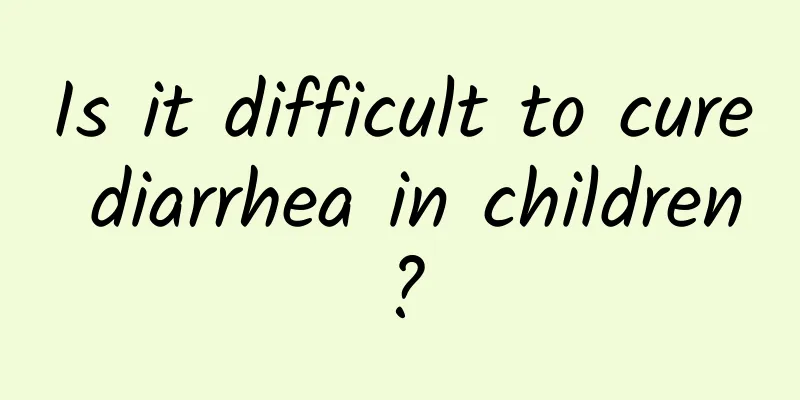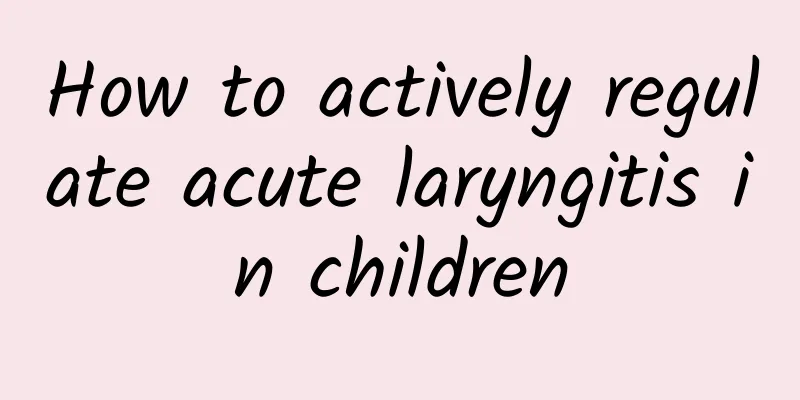Is it difficult to cure diarrhea in children?

|
Baby diarrhea is a headache for many young parents. Many people first think of conventional treatments such as taking medicine, injections, and infusions. However, children's bodies are relatively fragile. In the process of treating pediatric diarrhea, these methods can only be used at the last minute. So, how should we prevent and treat baby diarrhea? 1. Breastfeeding can prevent diarrhea Breastfeeding should be especially adopted in the first few months after birth because breast milk is most suitable for infants' nutritional needs and digestive ability. Breast milk contains a variety of digestive enzymes and antibodies needed by children. Various nutrients are very suitable for children's digestion and absorption. It can neutralize Escherichia coli enterotoxins and prevent infection with Escherichia coli. It is much better than cow's milk and breast milk substitutes. Except for those suffering from tuberculosis, heart and kidney and other chronic diseases, breastfeeding should be promoted. Attention should be paid to the correct feeding method, regular breastfeeding, and avoid weaning in summer and when the child is sick. Breastfeeding can prevent diarrhea in children. 2. Supplement with Obabyl probiotics. Its ingredients are oligofructose, dietary fiber, maltodextrin, Lactobacillus acidophilus, Bifidobacterium bifidum, Bifidobacterium infantis, Lactobacillus casei, vitamin C, vitamin B1, vitamin B2, vitamin B6, calcium lactate, and zinc lactate. The Bifidobacterium infantis and Lactobacillus casei in Obabyl probiotics can form a protective barrier on the surface of the intestinal mucosa to resist the invasion and damage to the intestinal mucosa, and can produce acidic substances such as lactic acid and acetic acid, creating an environment that is not conducive to the growth of harmful bacteria, inhibiting the growth and reproduction of harmful bacteria, and playing a role in regulating the intestinal flora. 3. Use a bowl and spoon instead of a bottle Bottles, especially rubber nipples, are easily contaminated and difficult to clean and disinfect. They are easily contaminated and can cause diarrhea in children. Use a bowl or spoon instead, which has less chance of contamination than a bottle. 4. Add complementary food on time Children grow and develop rapidly. Whether they are breastfed or bottle-fed, complementary foods should be added on time to meet their nutritional needs. When adding complementary foods, the variety should not be too many, and the changes should not be too frequent. Only after the baby gradually adapts to the new food can other foods be gradually added. Specifically, when adding complementary foods, pay attention to the baby's digestive ability. Only one type can be added at a time, from a small amount to a large amount, and gradually increase. Generally, vitamin C and D are added half a month after birth, vegetable soup, milk cake or rice paste are added at 2 to 3 months, and egg yolks, minced meat and chopped vegetables are added at 4 to 6 months. 5. Pay attention to the quality of your diet When mixed feeding and artificial feeding are adopted due to insufficient breast milk or lack of breast milk, attention should be paid to diet adjustment. It is not advisable to feed rice porridge or other foods too much or too early to avoid carbohydrate indigestion and affect the growth and development of children. If infants from birth to 3 months do not have enough breast milk, they can be supplemented with milk powder. Whether using cow's milk or milk substitute, it needs to be properly diluted to facilitate digestion and absorption. When the appetite is poor, it is not advisable to force feeding. 6. Improve your physical fitness Usually, we should strengthen outdoor activities, improve the ability to adapt to the natural environment, pay attention to physical exercise of children, strengthen their physical fitness, improve the body's resistance, and avoid infection with various diseases. 7. Avoid adverse stimuli Children should avoid excessive fatigue, fright or excessive mental stress in their daily lives, as these may cause diarrhea in children. The above are some common problems that should be paid attention to in the treatment of pediatric diarrhea. These problems cannot be ignored, otherwise, it will eventually lead to the weakness of your child's constitution and cause more serious consequences. Sometimes when we are treating, it is because we do not pay attention to these details that we do not achieve good results. |
<<: What medicine should children take for diarrhea
>>: Three Meal Recipes for Children with Diarrhea
Recommend
What medicine is good for neonatal jaundice? Precautions for neonatal jaundice medication
Many newborns may suffer from jaundice after birt...
Is hand, foot and mouth disease contagious?
Hand, foot and mouth disease is contagious. It is...
Is it difficult to cure diarrhea in children?
Experts tell us that pediatric diarrhea means tha...
What are the symptoms of polio?
Polio is a common disease that mostly affects chi...
What are the ways to prevent mumps in life?
Mumps is quite common in children. Sometimes it i...
How to treat newborn baby's red buttocks? 4 effective ways to deal with newborn baby's red buttocks
Many newborns will have diaper rash, which can ca...
What is the treatment for kidney disease in children?
With the improvement of quality of life and livin...
How to treat tonsillitis caused by cold in children
Tonsillitis caused by a cold in children needs to...
Can I go to school normally if I have mumps?
Can I go to school normally if I have mumps? 1. P...
What are the drugs for treating ADHD?
According to previous domestic surveys, the incid...
What should I do if my baby has indigestion? What are the ways to prevent my baby from having indigestion?
Indigestion in infants is a common phenomenon. In...
What are the common causes of hand, foot and mouth disease in babies?
Hand, foot and mouth disease in babies is usually...
What are the symptoms of hand, foot and mouth disease in adults?
Symptoms of hand, foot and mouth disease in adult...
What is the cause of hand, foot and mouth disease? How to effectively prevent the occurrence of hand, foot and mouth disease
Overview of hand, foot and mouth disease: Hand, f...
How to treat physiological jaundice in infants? Master the three treatments for physiological jaundice in infants
When newborns develop jaundice, many parents will...









